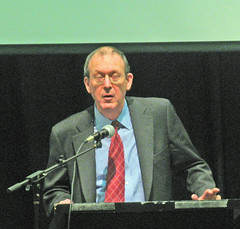 New York Times columnist Clyde Haberman, featured speaker at tonight's Brooklyn Heights Association annual meeting, and Professor Sybil Trelawney of Hogwarts School of Witchcraft and Wizardry, have something in common: neither is any good at predicting the future. The difference is that Haberman admits it. Tasked with giving an address on the future of life in New York City, he began by saying he hadn't a clue. He noted the failure of previous prognostications, particularly in the late 1970s when it was widely believed that the City was in permanent decline. Now that prosperity has returned, at least for many, he said the question being asked is whether the City can retain its unique character, its "soul". Many people fear the homogenization caused by the proliferation of chain stores and restaurants at the expense of locally owned establishments, and cited Montague Street as an example. (Haberman, briefly a Willow Street resident early in his career, retains a Heights connection through a daughter, son-in-law and grandchild who live here.) Can government do anything about the loss of "mom and pop" businesses? Haberman said he's not sure it can. Asked during the Q&A period by BHA Executive Director Judy Stanton whether restrictive zoning, subsidies or both could be effective, Haberman said any government policy or program intended to thwart the entry of chains would "bump up against what people want": that is, lower prices and perhaps better selection and service. He also said, "Don't get too woozy about the 'good old days'", citing Times Square as an example. While some people complain of the theme park like atmosphere of the new Times Square, Haberman recalled being intimidated by the pimps and drug dealers who hung out there when he was a young Times reporter. He did say, however, that he missed the three-card monte artists.
New York Times columnist Clyde Haberman, featured speaker at tonight's Brooklyn Heights Association annual meeting, and Professor Sybil Trelawney of Hogwarts School of Witchcraft and Wizardry, have something in common: neither is any good at predicting the future. The difference is that Haberman admits it. Tasked with giving an address on the future of life in New York City, he began by saying he hadn't a clue. He noted the failure of previous prognostications, particularly in the late 1970s when it was widely believed that the City was in permanent decline. Now that prosperity has returned, at least for many, he said the question being asked is whether the City can retain its unique character, its "soul". Many people fear the homogenization caused by the proliferation of chain stores and restaurants at the expense of locally owned establishments, and cited Montague Street as an example. (Haberman, briefly a Willow Street resident early in his career, retains a Heights connection through a daughter, son-in-law and grandchild who live here.) Can government do anything about the loss of "mom and pop" businesses? Haberman said he's not sure it can. Asked during the Q&A period by BHA Executive Director Judy Stanton whether restrictive zoning, subsidies or both could be effective, Haberman said any government policy or program intended to thwart the entry of chains would "bump up against what people want": that is, lower prices and perhaps better selection and service. He also said, "Don't get too woozy about the 'good old days'", citing Times Square as an example. While some people complain of the theme park like atmosphere of the new Times Square, Haberman recalled being intimidated by the pimps and drug dealers who hung out there when he was a young Times reporter. He did say, however, that he missed the three-card monte artists.
As an example of how life in the City had improved over the years, Haberman recalled his surprise on returning after an overseas assignment of several years, and finding "ordinary working people" catching a bit of sleep in subway cars on their rides home during the early morning hours. Back in the 1970s, he said, no one would do that for fear of being robbed. He concluded by opining, "We can survive relative prosperity."


